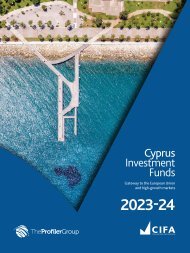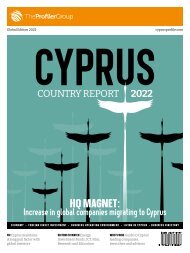2020 Cyprus Country Report
The 2020 Cyprus Country Report features in-depth articles on the economy, foreign direct investment, international trade and headquartering as well as detailed sector profiles and insights from Cyprus’ 100 most influential political, economic and business leaders shaping the future of their country and its industries.
The 2020 Cyprus Country Report features in-depth articles on the economy, foreign direct investment, international trade and headquartering as well as detailed sector profiles and insights from Cyprus’ 100 most influential political, economic and business leaders shaping the future of their country and its industries.
Create successful ePaper yourself
Turn your PDF publications into a flip-book with our unique Google optimized e-Paper software.
Education<br />
main priority of the<br />
A Ministry of Education,<br />
Culture, Sport and Youth<br />
for 2021, gaining urgency<br />
after the experience of<br />
the global health crisis,<br />
is the further integration<br />
of digital technology in<br />
<strong>Cyprus</strong>’ public education<br />
system. Within this<br />
context, our plans for<br />
the new school year took<br />
into account the latest<br />
epidemiological data and<br />
adhering to the advice<br />
of public health experts.<br />
Already, electronic<br />
enrolment to secondary<br />
schools has been<br />
completed successfully<br />
for the <strong>2020</strong>-21 school<br />
year, whereas legislation<br />
is underway to establish<br />
and safeguard distance<br />
learning. Additionally,<br />
efforts are made to<br />
develop an e-Learning<br />
Database, as well<br />
as to implement a<br />
comprehensive roadmap<br />
for digital sufficiency<br />
in schools, both in<br />
equipment and, through<br />
systematic training,<br />
teachers’ digital skills.<br />
A GROWING SECTOR<br />
The island’s first university – the University of<br />
<strong>Cyprus</strong> (UCY) – was established as recently as<br />
1989, yet even before that only the US and Canada<br />
had more graduates per capita as Cypriots sent<br />
their children to universities abroad. Today the<br />
landscape is vastly different with eight rapidly<br />
expanding universities, five of which are private,<br />
that have forged links and cooperative agreements<br />
with reputable universities across the<br />
globe.<br />
<strong>Cyprus</strong> has steadily established itself as a hub<br />
for quality higher education (HE). Over the last<br />
decade, the sector has grown by more than 80%<br />
in student numbers, exceeding 47,000 students<br />
during 2017-2018. In 2016 alone the education<br />
sector is estimated to have contributed around<br />
€900 million to the local economy and was responsible<br />
for approximately 9,500 jobs in HE and<br />
its supporting industries.<br />
The number of foreign students choosing<br />
<strong>Cyprus</strong> for their studies has almost tripled in<br />
the last five years, representing over 60 different<br />
countries and supporting the growth of <strong>Cyprus</strong><br />
into a true global educational centre. A major attraction<br />
for students from non-EU countries is<br />
that compared to many other countries, <strong>Cyprus</strong><br />
offers a value-for-money education and qualifications<br />
recognised by EU members and validated<br />
by accreditation agencies of various countries.<br />
But more than affordability, it is the high academic<br />
standards that are attracting a growing number<br />
of students from prosperous countries such as the<br />
United States, Canada, Australia and even New<br />
Zealand.<br />
The number of overseas students at the island’s<br />
accredited universities soared from fewer than<br />
400 in the 2004-2005 academic year to 17,601 in<br />
2015-16, and exceeded 50,000 in 2018-19. Some<br />
50% of overseas students were from Greece and<br />
the EU, but the range of countries that foreign<br />
students come from is rapidly expanding. A 2018<br />
EY report estimated that if the current level of<br />
HE activity in <strong>Cyprus</strong> is sustained and complemented<br />
by a moderate growth in international<br />
students and research expenditure, the sector’s<br />
economic contribution could grow by a further<br />
€400 million by 2023.<br />
CLIMBING UP THE RANKINGS<br />
The academic reputation of <strong>Cyprus</strong> universities<br />
has also been growing, with institutions climbing<br />
up international rankings. UCY is currently<br />
among the world’s top 400 universities and the<br />
67 th best of institutions that are under 50 years<br />
old, according to the Times Higher Education<br />
World University Rankings, an influential data<br />
provider in Britain that assesses university<br />
performance globally. In 63 rd place is another<br />
public institution, the research-focused <strong>Cyprus</strong><br />
University of Technology (CUT/Tepak), established<br />
in Limassol in 2004. CUT is also ranked<br />
as the 17 th best university in the world with fewer<br />
than 5,000 students in 2019. In addition, <strong>Cyprus</strong><br />
claimed two of the top three spots on the ‘New<br />
Europe’ table of the best research-intensive universities<br />
within the 13 nations that have joined<br />
the EU since 2004, in which CUT ranked first<br />
for citation impact, while UCY led on industry<br />
income and international outlook measures.<br />
Sector Profile<br />
Prodromos Prodromou<br />
Minister of Education,<br />
Culture, Sport and Youth<br />
UniHalls Premier<br />
<strong>Country</strong> <strong>Report</strong> CYPRUS <strong>2020</strong> 75

















